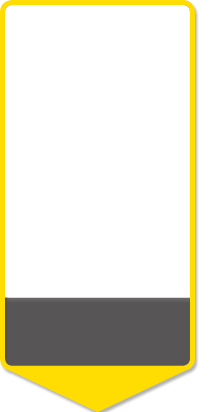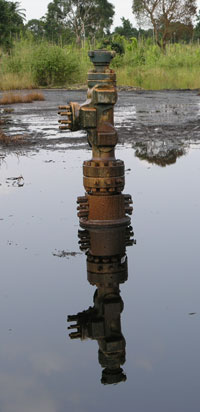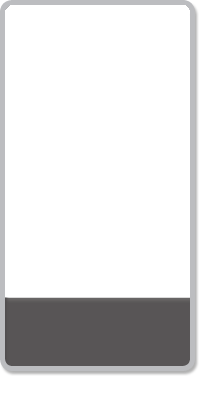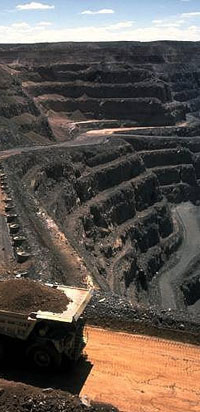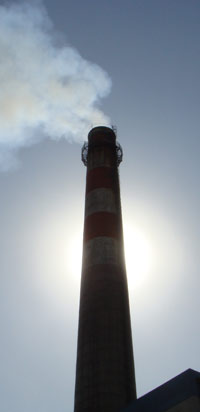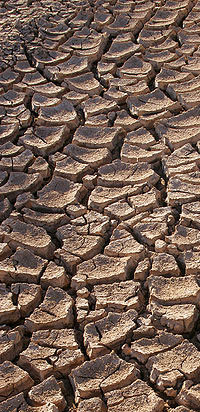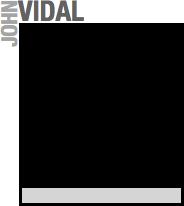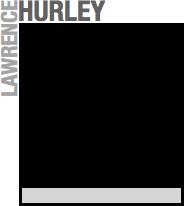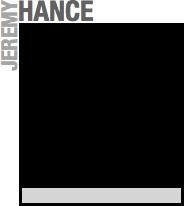
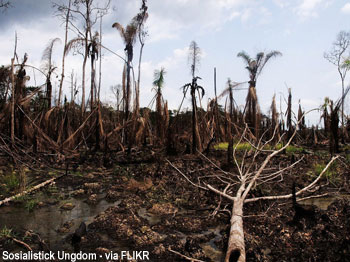 Royal Dutch Shell has accepted legal liability for a pair of 2008 oil spills in Nigeria that may have leaked as much oil as the Exxon Valdez disaster.
Royal Dutch Shell has accepted legal liability for a pair of 2008 oil spills in Nigeria that may have leaked as much oil as the Exxon Valdez disaster.
The company faces an additional suit alleging collusion with Nigeria's government in human rights abuses. Meanwhile the United Nations reports that five decades of oil spills in Nigeria's Ogoniland region will take more than 30 years and a billion dollars to remediate.
For years, the oil companies have gotten away with blaming vast oil spills on theft by poor villagers, but a powerful mafia controls the more than $1.5 billion in annual theft. Ships and massive barges are found regularly in the creeks, laden with stolen oil. Theft on this scale requires collusion between criminal gangs and the authorities: armed services, oil company executives, and political elites. However, two major spills in 2008 in Ogoniland are a different matter; Shell has always accepted responsibility for them. But affected communities avoided long delays and possible court corruption by taking their case to the London courts rather than the Nigerian ones. Now Shell will have to clean up the spills properly and pay more compensation. Other communities around the world are now certain to seek justice in London.
What happens in Africa stays in Africa: More oil gets spilled in the Niger Delta every year than the Deepwater Horizon spill. The local people have lived with oil pollution all their lives. Nigeria has good laws, but they are unenforceable, and the local clean-up contractors do not work to international standards. The U.N. report found that most of the land supposedly cleaned was still contaminated.
I was surprised to learn: This has been going on for so long that people despair. But there are some brave young Nigerians who work for human rights and environment groups, like ERA and CEHRD, or are in the media, who take big risks and are often threatened.
Read more about this topic
Shell’s admission of liability for two spills in Nigeria is just part of a much bigger story about the company’s decades-long operations in the Ogoni region. The company is currently fighting a lawsuit filed in the United States (Kiobel v. Shell) in which it is accused of aiding and abetting human rights violations committed by the Nigerian government, including acts of murder and rape. The plaintiffs allege that when the Ogoni people started to organize against Shell in the early 1990s over environmental pollution, Shell sought the assistance of the Nigerian government in cracking down on the protests. In 1993-94, the Ogoni people say they were brutally suppressed. The plaintiffs say Shell helped transport Nigerian forces, let the Nigerian forces use Shell property as staging grounds for attacks, and provided food and compensation to soldiers.
I’ll be watching: The U.S. Supreme Court is likely to decide whether federal courts have jurisdiction to hear claims made against a company by non-U.S. citizens. Shell and other companies involved in similar cases say that only individuals can be sued. The Supreme Court is due to decide later this year whether to take up the Shell case.
Notable quote: The Financial Times story on the spill settlement says that a 2005 European Court of Justice ruling “made it easier for groups of litigants to launch legal action in the European courts and gives claimants an automatic right to sue in the defendant’s home country,” which suggests there are likely to be more cases like this in the future.
An incredibly thorough U.N. Environment Program report found that Royal Dutch Shell had not lived up to the Nigerian government's or its own standards in its decades of oil extraction in Nigeria's Ogoniland, resulting in widespread oil pollution that continues to place people and ecosystems at risk. For its part, Shell blamed the local communities, saying “illegal refining and oil theft” was behind the bulk of contamination. But the company agreed to pay $1 billion to jump start a long-awaited cleanup effort, which the U.N. says will take three decades. This is a step forward for the Niger delta in that oil pollution — some of which has lingered for decades — may finally be appropriately mitigated.
Deep in the delta: The report found that 1 million people are threatened by pollutants, many of them carcinogenic, while the freshwater ecosystems they formerly depended upon for subsistence have been trashed. Americans should be aware that Nigeria is one of the top importers of oil to the United States.
Notable quote: "This report proves Shell has had a terrible impact in Nigeria but has got away with denying it for decades, falsely claiming they work to best international standards," Audrey Gaughran, Global Issues Director of Amnesty, said in a press release. "Trying to hide behind the actions of others, when Shell is the most powerful actor on the scene, simply won't wash."
Read more
- Oil Horror in Nigeria: 30 years, One Billion Dollars to Clean Up [By Jeremy Hance, Mongabay.com]
- Nigerian Oil Pollution May Need World's Biggest Clean-up and Take 30 Years [By Ola Awoniyi comments_image COMMENT NOW! , AlterNet]
- Nigeria Oil Spills Have Created Ecological Disaster, Report Says [By Robyn Dixon , Los Angeles Times]
| Tweet This Page |

